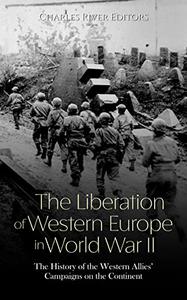
The Liberation of Western Europe in World War II: The History of the Western Allies' Campaigns on the Continent by Charles River Editors
English | December 18, 2022 | ISBN: N/A | ASIN: B0BQL43538 | 320 pages | EPUB | 14 Mb
During World War II, the free world literally hung in the balance, with the Axis and Allies engaging in warfare on an unprecedented scale. Although Hitler's Nazi Germany had overrun much of the European continent by 1940, the Allies began to reverse the momentum in 1942. By the end of 1943, with Allied forces firmly established in Italy and the Soviets on the verge of turning the tide in Russia, the British and Americans began to Description the invasion that would liberate Europe from the Nazis.
During the first half of 1944, the Americans and British commenced a massive buildup of men and resources in the United Kingdom, while Allied Supreme Commander Dwight D. Eisenhower and military brass planned the details of an enormous and complex amphibious invasion of Europe. Though the Allies used misinformation to try deceiving the Germans, the most obvious place for an invasion was just across the narrow English Channel, and the Germans had built coastal fortifications throughout France to protect against just such an invasion.
The invasion across the Channel came in the early morning hours of June 6, 1944. That day, forever known as D-Day, the Allies commenced Operation Overlord by staging the largest and most complex amphibious invasion in human history. The complex operation would require tightly coordinated naval and air bombardment, paratroopers, and even inflatable tanks that would be able to fire on fortifications from the coastline, all while landing over 150,000 men across nearly 70 miles of French beaches. Given the incredibly complex plan, it's no surprise that General Eisenhower had already written a letter apologizing for the failure of the invasion, which he carried in his coat pocket throughout the day.
After the successful amphibious invasion on D-Day in June 1944, the Allies began racing east toward Germany and liberating France along the way. The Allies had landed along a 50 mile stretch of French coast, and despite suffering 8,000 casualties on D-Day, over 100,000 still began the march across the western portion of the continent. By the end of August 1944, the German Army in France was shattered, with 200,000 killed or wounded and a further 200,000 captured. However, Adolf Hitler reacted to the news of invasion with glee, figuring it would give the Germans a chance to destroy the Allied armies that had water to their backs. As he put it, "The news couldn't be better. We have them where we can destroy them."
Regardless of the term for it, and despite how desperate the Germans were, the Battle of the Bulge was a massive attack against primarily American forces that inflicted an estimated 100,000 American casualties, the worst American losses in any battle of the war, However, while the German forces did succeed in bending, and at some points even breaking through Allied lines (thus causing the "bulge" reflected in the moniker), the Germans ultimately failed.
After resisting the German attack, the Allied armies began advancing, and with that, the race to Berlin was truly on. While much has been written of the Battle of the Bulge, Okinawa, Midway, Stalingrad, and many other conflicts of the Second World War, the Battle for Berlin has remained in the shadows for many historians. Its importance in toppling Hitler cannot be denied, despite the fact that some thought its strategic value unnecessary to the war itself. In the weeks it took for the Battle of Berlin to be fought, an American president passed away, a British Prime Minister had to make concessions he did not desire, a Russian leader fought his way into Western Europe to stay, and a German one took his own life. The battle's implications would be felt for the next 50 years.
https://1dl.net/z7g77lc36c27/f8er2.T.L.o.W.E.i.W.W.I.T.H.o.t.W.A.C.o.t.C.rar

https://rapidgator.net/file/96429d6e1c6f1ce877d7eec018b00562/f8er2.T.L.o.W.E.i.W.W.I.T.H.o.t.W.A.C.o.t.C.rar.html
https://rapidgator.net/file/0eb181da046c3aa7ff92e7f14564dde7/f8er2.T.L.o.W.E.i.W.W.I.T.H.o.t.W.A.C.o.t.C.rar.html

https://freshwap.cc/view/2D91EE03660BD12/f8er2.T.L.o.W.E.i.W.W.I.T.H.o.t.W.A.C.o.t.C.rar
https://freshwap.cc/view/257DA142713EA8C/f8er2.T.L.o.W.E.i.W.W.I.T.H.o.t.W.A.C.o.t.C.rar

https://uploadgig.com/file/download/6c0B75e9Dfa5645e/f8er2.T.L.o.W.E.i.W.W.I.T.H.o.t.W.A.C.o.t.C.rar
https://uploadgig.com/file/download/57aEDf2fb778938f/f8er2.T.L.o.W.E.i.W.W.I.T.H.o.t.W.A.C.o.t.C.rar
 Views: 0
Views: 0  Comments (0)
Comments (0)
free The Liberation of Western Europe in World War II The History of the Western Allies' Campaigns on the Continent, Downloads The Liberation of Western Europe in World War II The History of the Western Allies' Campaigns on the Continent, RapidShare The Liberation of Western Europe in World War II The History of the Western Allies' Campaigns on the Continent, Megaupload The Liberation of Western Europe in World War II The History of the Western Allies' Campaigns on the Continent, Mediafire The Liberation of Western Europe in World War II The History of the Western Allies' Campaigns on the Continent, DepositFiles The Liberation of Western Europe in World War II The History of the Western Allies' Campaigns on the Continent, HotFile The Liberation of Western Europe in World War II The History of the Western Allies' Campaigns on the Continent, Uploading The Liberation of Western Europe in World War II The History of the Western Allies' Campaigns on the Continent, Easy-Share The Liberation of Western Europe in World War II The History of the Western Allies' Campaigns on the Continent, FileFactory The Liberation of Western Europe in World War II The History of the Western Allies' Campaigns on the Continent, Vip-File The Liberation of Western Europe in World War II The History of the Western Allies' Campaigns on the Continent, Shared The Liberation of Western Europe in World War II The History of the Western Allies' Campaigns on the Continent, Please feel free to post your The Liberation of Western Europe in World War II The History of the Western Allies' Campaigns on the Continent Download, Movie, Game, Software, Mp3, video, subtitle, sample, torrent, NFO, Crack, uploaded, putlocker, Rapidgator, mediafire, Netload, Zippyshare, Extabit, 4shared, Serial, keygen, Watch online, requirements or whatever-related comments here.
Related Downloads :
{related-news}


